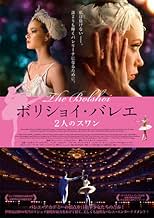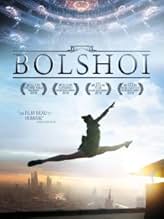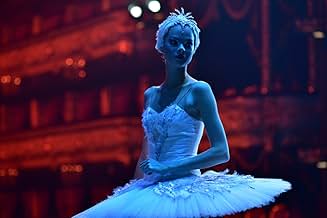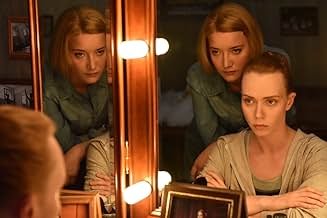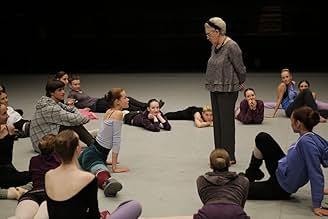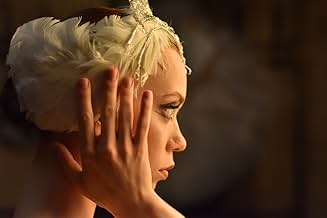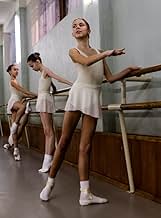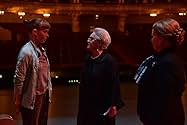Bolshoy
- 2017
- 2h 12min
PUNTUACIÓN EN IMDb
6,8/10
1,1 mil
TU PUNTUACIÓN
Añade un argumento en tu idiomaA Russian ballerina struggling for one play in Bolshoy theatre.A Russian ballerina struggling for one play in Bolshoy theatre.A Russian ballerina struggling for one play in Bolshoy theatre.
- Premios
- 6 premios y 10 nominaciones en total
Argumento
¿Sabías que...?
- CuriosidadesIn Russia, the premiere took place on May 11, 2017.
Reseña destacada
I was surprised at how much I loved this film. I didn't know what to expect, but then, that's often one great joy of Russian film. A young Russian girl from a depressed family in a backwater mining town is spared reform school after an aging drunkard ex-ballet-star from the Bolshoi Theatre recognises her rare natural talent purely by chance. He swallows the shame of his own personal failure to pitch her to a training school in Moscow with the hope that after eight years she'll be accepted to the Bolshoi Ballet as a soloist. That's the first five minutes; then the real struggle begins. Julia's journey to stardom is plagued by pain, poverty, loveless isolation, loneliness, betrayal, backstabbing and at times incredible loyalty and sacrifice. To call her story epic would be an understatement. Following the initial set up the story settles into a rhythm of flashback sequences inter cutting fragments of Julia's early hardships with challenges in the present. To tell the story chronologically would be tedious and disconnected; she is nearly ten years older at the end of the film than in the beginning. By establishing the story in the past, moving to the present and then stitching in flashback sequences the hardships of her past are given greater bearing on the challenges facing her in the present. From the opening frames the cinematography is just stunning; the tracking is superb; there is so much elegant movement in this film; it's a dance with the camera. The use of focus-shifts, of depth-of-field to suggest movement is beautiful; small moments speak volumes. The Mise en scene is stunning; whether in the boondocks, on the rooftops, in the snow, or at the dancers barre. One great star of this is Bolshoi Theatre itself with it's majestic scale and gilded presence; Todorovsky had it for one week to complete all interior and dance shots. Remember, this includes two shooting casts; both young Julia and older Julia, with all her contemporary peers. The diegetic sound is superb; the music slips from contemporary score to Tchaikovsky seamlessly. The casting is great; Julia's trainer at the academy is a near forgotten aging star herself, an exceptional performance by Alisa Freyndlikh. The young Julia is breathtaking; and when older so is her chief competitor; Margarita Simonova gives a superb performance too as the mature Julia. Philosophically: Following on from the striking modernism of the post-revolutionary period Soviet film quickly concerned itself with 'Realism' whereby the role of film was to give a true indication of what life is really like. Fabulous examples are Kalatazov "The Cranes Are Flying", Shepitko "The Ascent", Chukrai "Ballad of a Soldier", and even Tarkovsky's "Ivan's Childhood". All are exceptionally moving, fleshing out the tragic lives of ordinary people, but this realism is not unique to Soviet film culture. It manifests deeply in Russian art and culture through a millennia, and continues unabated in recent films such as Konchalovsky's "The Postman's White Nights", Zvyagintsev's "Loveless", Melnik's epic "Territoriya" and as it happens we see it in Todorovsky's "The Bolshoi" too. Julia's story is realist; it is imbued with grace, jealousy, sadness and compassion; even after 132 minutes the end is only a beginning; her struggle will go on. But in that last moment of film we feel great emotion too. There are moments when the film falters. At the three quarter mark something goes amiss; whether it was the shooting schedule, lost shots, illness, or that Todarovsky simply dropped the ball it's impossible to say. But after a few minutes the film recovers; equilibrium is restored. Only one choice really grated with me and that was the choice, toward the conclusion, for the visiting foreign 'star' performer Antoin to speak his lines in what I can only call a very troubling English; it would have been a better and more natural choice to have used French. At a later moment, when they do use French, it is seamless and fitting. A lovely, brilliant film; the end is simply one moment in a long struggle; a realist film, at once both sad and joyful. Very Russian.
- stafbettridge
- 20 oct 2017
- Enlace permanente
Selecciones populares
Inicia sesión para calificar y añadir a tu lista para recibir recomendaciones personalizadas
Detalles
Taquilla
- Recaudación en todo el mundo
- 3.990.117 US$
- Duración2 horas 12 minutos
- Color
- Mezcla de sonido
- Relación de aspecto
- 2.35 : 1
Contribuir a esta página
Sugerir un cambio o añadir el contenido que falta

Principal laguna de datos
By what name was Bolshoy (2017) officially released in Canada in English?
Responde
